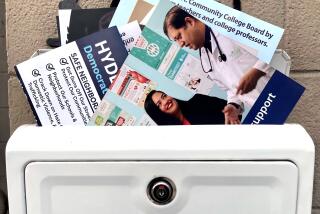When the Phone Rings During Dinner
- Share via
Most people have encountered annoying, high-pressure telemarketers who call at dinner to hawk everything from credit cards to telephone service. Because existing federal laws are mostly ineffective at reducing unwanted telemarketer calls, the burden is on the consumer to ask to be placed on a do-not-call list. MAURA E. MONTELLANO spoke to one consumer about how he handles unsolicited callers and to a consumer affairs spokesperson.
*
KEITH HALL Jr.
52, substitute teacher, Costa Mesa
My home is my castle and I don’t like being intruded upon. Telemarketers intrude, uninvited, and invade my home and it’s usually when I’m about to sit down to have dinner. At least with solicitors at the door I have the advantage of checking through the peephole and deciding not to open my door. But with the phone, there is no way to tell who is on the line. I’ve noticed that when I pick up and answer the phone there is dead silence and suddenly someone comes on and they start their spiel. Once they know there is someone live on the line and not a machine, they hook you.
I learned a long time ago that they have a script and they have a counter-argument to everything I might have to say. If I say, “No, thank you. I can’t afford it,” they quickly come back with, “Well, you can’t afford not to, sir.” I have learned to counter their counter. If they want to clean my carpets, I tell them I have hardwood floors. If they want me to contribute to some charity, I tell them I’ve just declared bankruptcy.
They are getting slicker too. Now they don’t even ask me if I want the service in the first place. I am now told that I have already been signed up and they just need to confirm my address or payment. I’m not sure if they think I am stupid or if I’m not going to object. I wouldn’t be dumb enough to give up personal information like credit card numbers to just any stranger at my door, much less a stranger on the phone.
A couple of times, I’ve been harangued by an aggressive telemarketer, but most back off after I let them know I am not interested a couple of times. I don’t hang up on anybody because I think that would be rude. I realize it’s their job.
I’m not sure how they get my phone number or how I get on their lists. I had a telemarketer tell me once that she got in touch with me by just pulling my name up on a computer list.
What You Should Do
*
PASTOR HERRERA
Director of the Los Angeles County Department of Consumer Affairs
Most telemarketers are part of the Direct Marketing Assn., which has member companies from the U.S. and 49 other nations. Its members include marketers from consumer and business-to-business segments and include catalogers, financial services, computer sellers, book and magazine publishers and retail stores that rely on the telephone as a marketing tool.
First of all, any company calling you can only call between the hours of 8 a.m. and 9 p.m. They are also required to tell you it’s a sales call and what they are selling before they even begin with their sales pitch.
If a consumer tells the telemarketer they don’t want them bothering them anymore, by law they must not make any future calls to you. The Federal Trade Commission enforces this regulation. If this doesn’t work, the consumer needs to contact the DMA in writing. One should send his or her name, address and home phone number and ask to be removed from their national solicitation lists. Write to: DMA Telephone Preference Service, P.O. Box 9014, Farmingdale, N.Y. 11735-9014. Website: https://www.the-dma.org.
More to Read
Inside the business of entertainment
The Wide Shot brings you news, analysis and insights on everything from streaming wars to production — and what it all means for the future.
You may occasionally receive promotional content from the Los Angeles Times.










